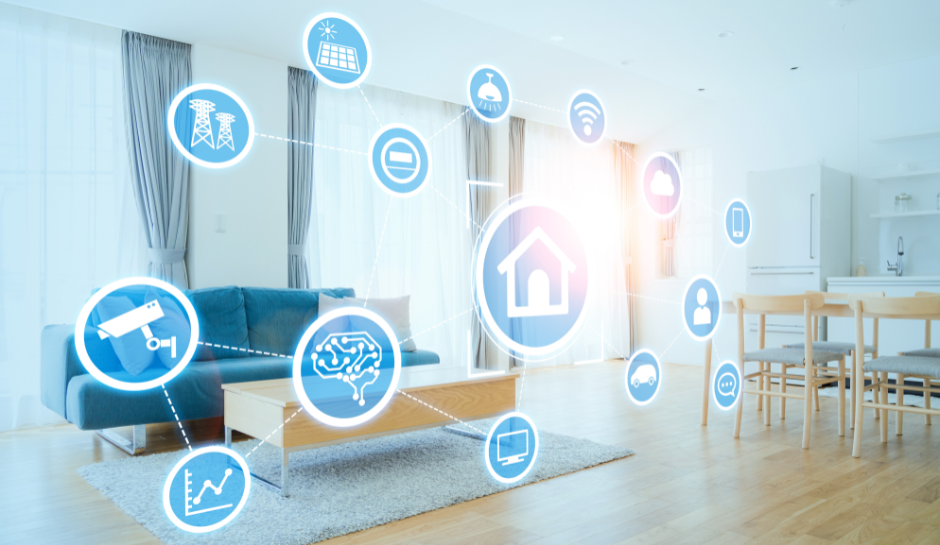Table of Contents
- Enhancing the Resident Experience
- Boosting Profitability
- Driving Sustainability
- Preparing Communities for AI
Residential communities are undergoing a significant transformation driven by advancements in artificial intelligence (AI). From senior living to multifamily and mixed-use properties, AI is revolutionizing how we manage and interact with our living spaces. Staying abreast of these AI-driven trends is crucial for properties that want to remain competitive. Here, we explore ways AI can improve the resident experience while improving profitability and sustainability.
Enhancing the Resident Experience
As smart home devices become an integral part of modern living, AI offers opportunities to improve the daily living experience in MDUs. For example, AI-driven apps can help residents control lights, thermostats, and locks. They can even learn to adjust controls for individual spaces based on residents’ habits. This can help residents save money while improving convenience. It can also improve accessibility for seniors and people with disabilities by enabling them to adjust their environment without physically accessing on-wall devices.
AI-powered virtual assistants can help residents manage daily tasks, provide entertainment, and offer reminders. They can help coordinate the use of common spaces for resident events or act as a virtual concierge. In senior living communities, these assistants can remind residents to take medication or help them schedule appointments.
AI-driven chatbots can also help property managers with routine inquiries and maintenance requests. They can also keep residents informed on the status of repairs and other events. Chatbots ensure 24/7 availability for non-urgent requests, reducing the workload on staff and improving response times and resident satisfaction. This also enables staff to focus on personal interactions that need the “human touch.”
For enhanced security and safety, AI can improve features such as biometric access and smart surveillance. This can help ensure that only authorized individuals can access residences. With real-time monitoring and alerts, AI-based security solutions can alert staff quickly to unusual activity or potential emergencies, enabling faster responses.
For senior housing communities in particular, AI technology can help monitor residents’ health through wearable devices and smart home sensors. This can ease residents’ minds and lessen the burden on staff by providing ongoing information on residents’ health and safety without constant personal check-ins. It can also provide more detailed information to support personalized care plans.
Boosting Profitability
AI not only enhances the resident experience but can also boost the profitability of multifamily properties by optimizing operations. For example, AI solutions can use sensors and machine learning for predictive maintenance. By monitoring the performance and condition of appliances, plumbing, and utilities, these tools can schedule maintenance before a breakdown occurs, reducing downtime and repair costs. For example, an AI solution can alert maintenance staff if a toilet has begun leaking. A single leaky toilet can cost over $1000 per year, not including the cost of water damage – so this can save money as well as prevent headaches!
AI-driven optimization of energy use can also save money. For example, AI solutions can adjust thermostats and lighting systems in common areas. They can even take into account factors such as occupancy and weather conditions.
AI can also help improve profitability by analyzing market trends and demand to adjust rent prices dynamically. For example, factors such as local market conditions, historical pricing data, and current demand can help properties remain competitive while maximizing revenue. While managers can undoubtedly perform these types of calculations, AI-based solutions can potentially take into account more factors and update them more frequently to optimize pricing.
Similarly, AI-assisted analytics and machine learning can help spot opportunities in everything from marketing to operations. For example, by analyzing audience data, AI can suggest better ways to target and personalize messaging to prospects. Digital agents can jumpstart the leasing process by guiding prospects through their first inquiries. They can also screen prospective tenants and schedule property tours, ensuring leads aren’t missed. Some properties have also used AI to analyze operations and determine where hangups occur to streamline processes. There are even AI-based solutions for review management!

Driving Sustainability
Sustainability is becoming a selling point for modern residential communities. Many residents, especially in younger generations, say they prefer properties that support sustainable living. Green properties not only have lower operating costs but also command rent premiums. AI can help multifamily properties become more eco-friendly. For example, smart irrigation systems can adjust water usage based on weather forecasts and soil moisture levels. This enables properties to reduce water waste while maintaining beautiful landscapes.
As noted previously, AI solutions can also optimize heating, cooling, and lighting to minimize energy waste while decreasing operating costs. AI can even help with waste management by sorting out recycling. This assistance reduces the amount of waste sent to landfills while lessening the burden on residents.
Preparing Communities for AI
AI solutions are only part of what’s needed in modern housing communities. To support these solutions, it’s crucial to establish the right digital infrastructure.
Properties must invest in fast, reliable connectivity, including Wi-Fi and wired connections that can support the increasing number of connected devices. A property’s connectivity infrastructure needs to be able to accommodate not only devices pre-installed by the property, but also resident devices such as phones, TVs, gaming systems, and wearables. It also needs to perform well even when many residents are using it. Fiber provides a good foundation for AI-powered solutions and other connected devices. Properties will also need to ensure that their Wi-Fi architecture can handle the resulting traffic without degraded performance.
Because AI-enabled solutions can potentially collect personal and sensitive data, it’s essential that properties take action to preserve data security and privacy. Ideally, properties should implement cybersecurity at every stage, from designing and building products and systems to their implementation, use, and management, and even how staff respond when an attack is detected. It’s also important to ensure that managers make residents aware of what data these solutions collect and how systems will use that data.
It’s vital that everyone, from management and owners to staff, understand where AI excels and where it does not. AI will never be able to replace all facets of human interaction; there is a need to maintain a human connection with residents. To improve resident satisfaction, consider how best to achieve a balance between AI automation and human interaction. Also, be sure to review processes on an ongoing basis to ensure fairness and transparency, as AI can be as subject to biases as humans are.
AI is transforming multifamily and senior housing: Modern housing is smart housing. Residents are increasingly coming to expect the integration of smart solutions in their daily living environment. By investing in connectivity and security, you can set your property at the forefront of this digital revolution.
Property owners need to invest in a robust and secure connectivity infrastructure to support the continuing demand for connected technology in multifamily and senior housing. WorldVue is your trusted provider that can help you meet these growing needs. Give us a call to find out how our solutions can help you meet housing community technology trends for connectivity, infotainment, and more!

